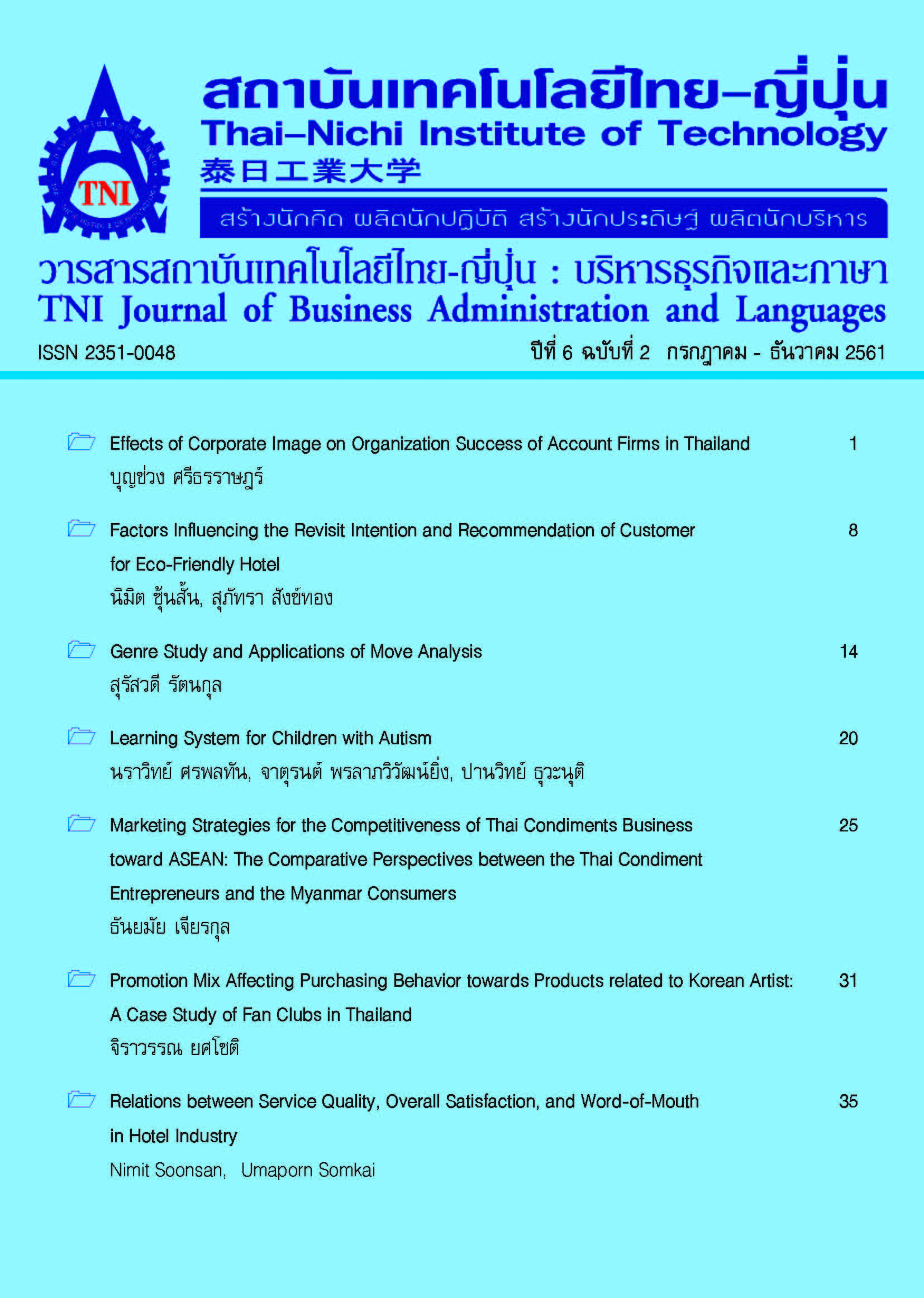Factors Influencing the Revisit Intention and Recommendation of Customer for Eco-Friendly Hotel
Main Article Content
Abstract
Eco-friendly hotel is the business which reduces the pollution and is good for sustainable preservation. This study investigated factors affecting the revisit intention and recommendation of customer perspective at eco-friendly hotel. 400 Thai customers were collected data at the hotel and analyzed with multiple regression analysis. The results showed that: 1) organic food, and healthy guestroom affected to visit intention. Moreover, organic food, healthy guestroom, and environmental protection affected to word-of-mouth intention. Discussion, conclusion, and suggestion was shown in the paper.
Article Details
Article Accepting Policy
The editorial board of Thai-Nichi Institute of Technology is pleased to receive articles from lecturers and experts in the fields of business administration, languages, engineering and technology written in Thai or English. The academic work submitted for publication must not be published in any other publication before and must not be under consideration of other journal submissions. Therefore, those interested in participating in the dissemination of work and knowledge can submit their article to the editorial board for further submission to the screening committee to consider publishing in the journal. The articles that can be published include solely research articles. Interested persons can prepare their articles by reviewing recommendations for article authors.
Copyright infringement is solely the responsibility of the author(s) of the article. Articles that have been published must be screened and reviewed for quality from qualified experts approved by the editorial board.
The text that appears within each article published in this research journal is a personal opinion of each author, nothing related to Thai-Nichi Institute of Technology, and other faculty members in the institution in any way. Responsibilities and accuracy for the content of each article are owned by each author. If there is any mistake, each author will be responsible for his/her own article(s).
The editorial board reserves the right not to bring any content, views or comments of articles in the Journal of Thai-Nichi Institute of Technology to publish before receiving permission from the authorized author(s) in writing. The published work is the copyright of the Journal of Thai-Nichi Institute of Technology.
References
“Traveler Statistics,” Ministry Of Tourism and Sports. [Online]. Available: https://www.mots.go.th/more_news.php?cid=411. [Access-ed: 15-Mar-2018].
P. Wachirawongsakorna and U. Timsungnern, “Assessment of Environmentally-Friendly Services of Hotels in the Lower Northern Part of Thailand,” Journal of environmental management, vol. 11, no. 1, pp. 98–113, 2015.
Sanit N. “Factors Affecting Behavior in Support of Being an Environmentally Friendly Hotel: A Case Study of Dusit Princess Srinakarin Hotel (Translated Title),” Dusit Thani College Journal, vol. 8, no. 1, pp. 16-33, 2014.
K. Tiwiwananukul and S. Pacharanon, “Green hotel management in economic aspects: A case study of Samed island,” Journal of Economics and Management Strategy, vol. 3, no. 2, pp. 50–60, Jan. 2018.
L. Cometa, “Consumer Beliefs About Green Hotels,” Master’s thesis of Science, Kent State University: Kent, Ohio, 2012.
M. Millar and S. Baloglu, “Hotel Guests’ Preferences for Green Hotel Attributes,” The USF Scholarship Repository, 2008. [Online]. Available: https://repository.usfca.edu/hosp/5. [Accessed: 10-Jun-2018].
M. Lee, H. Han, and G. Willson, “The Role of Expected Outcomes in the Formation of Behavioral Intentions in the Green-Hotel Industry,” Journal of Travel & Tourism Marketing, vol. 28, pp. 840–855, Nov. 2011.
C. Chia-Jung and C. Pei-Chun, “Preferences and Willingness to Pay for Green Hotel Attributes in Tourist Choice Behavior: The Case of Taiwan,” Journal of Travel & Tourism Marketing, vol. 31, no. 8, pp. 937–957, Nov. 2014.
H. Han, “Travelers’ pro-environmental behavior in a green lodging context: Converging value-belief-norm theory and the theory of planned behavior,” Tourism Management, vol. 47, pp. 164–177, Apr. 2015.
“Green hotel criteria,” Ministry of Natural Resources and Environ-ment. [Online]. Available: https://www.mnre. go.th/. [Accessed: 15-Mar-2018].
K. H. Kang, L. Stein, C. Y. Heo, and S. Lee, “Consumers’ willingness to pay for green initiatives of the hotel industry,” International Journal of Hospitality Management, vol. 31, no. 2, pp. 564–572, Jun. 2012.
I. Rahman and D. Reynolds, “Predicting green hotel behavioral intentions using a theory of environmental commitment and sacrifice for the environment,” International Journal of Hospitality Management, vol. 52, pp. 107–116, Jan. 2016.
H. Han, L. T. J. Hsu, J.-S. Lee, and C. Sheu, “Are lodging customers ready to go green? An examination of attitudes, demographics, and eco-friendly intentions,” International Journal of Hospitality Management, vol. 30, no. 2, pp. 345–355, Jun. 2011.
Y. J. Kim, R. Palakurthi, and M. Hancer, “The environmentally friendly programs in hotels and customers’ intention to stay: an online survey approach,” International Journal of Hospitality & Tourism Administration, vol. 13, no. 3, pp. 195–214, Jul. 2012.
D. Hays and D. Ozretic Dosen, “Greening hotels-building green values into hotel services,” Tourism and Hospitality Management, vol. 20, no. 1, pp. 85–102, Apr. 2014.
H. Han, L. T. Hsu, and C. Sheu, “Application of the Theory of Planned Behavior to green hotel choice: Testing the effect of environmental friendly activities,” Tourism Management, vol. 31, no. 3, pp. 325–334, Jun. 2010.
E. S. W. Chan, “Managing green marketing: Hong Kong hotel managers’ perspective,” International Journal of Hospitality Management, vol. 34, pp. 442–461, Sep. 2013.


